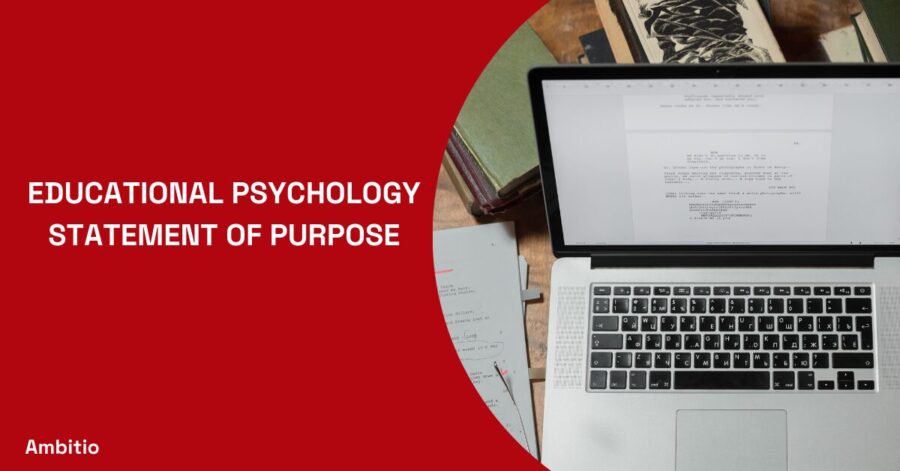13 December 2024
6 minutes read
Navigating Your Path to Success with an Exceptional Educational Psychology Statement of Purpose

Introduction
The journey to a fulfilling career in educational psychology begins with a compelling statement of purpose (SOP). This critical document is more than an essay; it’s a personal narrative that weaves together your academic achievements, professional experiences, and future aspirations. In the competitive arena of psychology programs, your SOP is a vital tool in showcasing your unique qualifications and passion for the field.
The Role of a Personal Statement in Educational Psychology Admissions
The personal statement, often referred to as a statement of purpose (SOP), plays a pivotal role in the admissions process for educational psychology programs.
This document is not just a formality; it is a critical component of your application that can significantly influence the admissions committee’s decision. Below, we delve deeper into the various aspects of how an SOP can impact your application and why it holds such significance.
Significance of the SOP in Showcasing Individuality
In the realm of educational psychology, where the focus is on understanding and enhancing the educational experience through psychological principles, your SOP is an opportunity to present yourself as a unique individual.
Unlike test scores and grades, which offer a limited view of your capabilities, the SOP allows you to narrate your journey, your passions, and your aspirations in your own words. It is a platform to express what motivates you, what challenges you’ve overcome, and what goals you aim to achieve in the field of educational psychology.
Reflecting on Academic and Professional Experiences
Your personal statement is the ideal place to expand on your academic and professional experiences relevant to educational psychology. Here, you can discuss specific courses, projects, or research that have shaped your understanding of the field.
This section is not just about listing your experiences, but rather about reflecting on them. You should articulate how these experiences have contributed to your growth and prepared you for a career in educational psychology.
For instance, you might describe a particular research project that sparked your interest in cognitive development or a teaching experience that highlighted the need for innovative educational strategies.
Demonstrating Fit and Alignment with the Program
The SOP is your opportunity to demonstrate how your aspirations align with the educational psychology program you are applying to. Research the program thoroughly and tailor your statement to reflect how your academic interests and career goals are in sync with the program’s offerings and faculty expertise.
This shows the admissions committee that you have a clear understanding of what the program entails and how it can help you achieve your professional objectives.
Mentioning specific aspects of the program, such as certain courses or faculty members whose work aligns with your interests, can further strengthen this section.
Articulating Long-Term Career Goals
In educational psychology, professionals are tasked with the crucial role of enhancing learning and developmental processes in educational settings. Your SOP should clearly articulate your long-term career goals in this field.
Whether you aspire to conduct research, develop educational programs, or engage in clinical practice, it is important to convey how the program will help you achieve these goals.
Discussing your future aspirations not only demonstrates your commitment to the field but also gives the admissions committee an insight into your potential for future contributions.
Showcasing Personal Qualities and Skills
Apart from academic achievements and professional experiences, educational psychology programs are interested in the personal qualities and skills you bring to the table.
Traits such as empathy, resilience, creativity, and a genuine passion for understanding and improving educational experiences are highly valued in this field. Use your SOP to highlight these qualities, providing examples from your life or career that demonstrate how you have applied these skills in practical settings.
Addressing Challenges and Growth
Your journey to pursuing a career in educational psychology might have included challenges and setbacks. The SOP is a place where you can address these experiences, not as shortcomings but as opportunities for growth and learning.
Discussing how you overcame obstacles or what you learned from these experiences can add depth to your profile and show your resilience and capacity for personal and professional development.
Conclusion: Reinforcing Your Passion and Readiness
In concluding your SOP, reinforce your passion for educational psychology and your readiness to embark on this academic journey. Summarize your key points and leave the admissions committee with a lasting impression of your enthusiasm, dedication, and potential to excel in their program.
The Art of Personalizing Your Psychology Personal Statement
Personalizing your SOP involves more than listing your accomplishments; it’s about showing your unique perspective and passion for educational psychology. This section of your application is an opportunity to give the admissions committee a glimpse into who you are beyond your academic records and test scores.
Integrating Personal Experiences and Professional Goals
Discuss how your personal experiences have influenced your interest in educational psychology. Maybe you were inspired by a particular educator, or a personal experience highlighted the importance of mental health in educational settings. Relate these experiences to your professional aspirations, demonstrating how they have shaped your career goals.
Reflecting on Your Strengths and Aspirations
Identify and articulate the strengths you possess that will aid in your success as an educational psychologist. Are you empathetic, analytical, or an excellent communicator? Explain how these qualities will help you excel in your studies and future career.
Also, discuss your long-term goals. Whether you aspire to conduct research, work in school settings, or engage in clinical practice, your SOP should clearly convey these ambitions.
Incorporating Examples and Insights into Your SOP
While your SOP should be uniquely yours, referring to examples can offer valuable insight into effective structures and content. Analyze different psychology personal statement examples to understand what works, but ensure your final piece is imbued with your personal voice and experiences.
Learning from Examples
Examine various SOP examples, noting the flow, language, and how candidates have presented their stories. Pay attention to how they have woven their academic and professional experiences with their personal journey. However, it’s crucial to use these examples only as a guide and not to replicate their content.
Avoiding Common Pitfalls in SOP Writing
Common mistakes in SOP writing include over-reliance on clichés, lack of focus, and not being specific enough about one’s interests and goals. Ensure your SOP is well-organized, clear, and directly relates to your interest in educational psychology. Avoid generic statements and focus on what makes your journey and aspirations unique.
Highlighting Academic and Research Interests in Educational Psychology
In this section, delve into the academic and research aspects that fascinate you about educational psychology. Discuss specific areas of interest, such as cognitive development, learning theories, or behavioral interventions, and how you wish to explore them further in your studies.
Connecting Coursework and Research Interests
Link your past coursework and any research experience to the areas of educational psychology that interest you. Perhaps a course on cognitive psychology piqued your interest in how children learn, or a research project on behavioral interventions solidified your desire to work in school settings. These connections demonstrate your academic readiness and genuine interest in the field.
Articulating Future Research Goals
Discuss your research aspirations. Maybe you aim to contribute to the development of more effective learning strategies or want to research the psychological impacts of educational policies. Be specific about how the program you’re applying to can help you achieve these research goals.
Reflecting on Professional Experiences and Their Impact
Professional experiences, such as internships, teaching, or working in educational settings, play a significant role in shaping your understanding of educational psychology. Reflect on these experiences in your SOP and discuss how they have prepared you for a career in this field.
Learning from Real-World Experience
Discuss any relevant professional experiences and what you learned from them. Maybe an internship at a school allowed you to observe different learning styles, or working with special needs children showed you the importance of tailored educational strategies. Explain how these experiences have equipped you with a practical understanding of educational psychology.
Linking Experience to Career Aspirations
Connect your professional experiences to your career goals. For example, if you’ve worked as a teacher and now aspire to be a school psychologist, discuss how your teaching experience has provided you with insights into student behavior and learning challenges. Show how these insights have motivated you to further your studies in educational psychology.
Concluding Your Statement: The Final Touches
The conclusion of your SOP is as important as the introduction. It’s your last chance to reinforce your interest and fit for the program. Summarize your key points, reaffirm your commitment to educational psychology, and express enthusiasm about the prospect of joining the program.
Crafting a Memorable Conclusion
In your conclusion, reiterate your passion for educational psychology and how the program aligns with your academic and career goals. Be concise but impactful, leaving the admissions committee with a clear understanding of your enthusiasm and potential contributions to their program.
Review and Feedback
Before finalizing your SOP, thoroughly review it for grammatical accuracy and flow. Seek feedback from mentors, professors, or colleagues. Their insights can help refine your statement, ensuring it effectively communicates your qualifications and aspirations.
Crafting a standout educational psychology statement of purpose is a journey of self-reflection and articulation of your academic and professional experiences.
By being authentic, thorough, and reflective in your writing, you can create a compelling narrative that resonates with admissions committees and paves the way for your success in the field of educational psychology.
FAQs
How long should my educational psychology personal statement be?
Generally, aim for one to two pages, adhering to any specific guidelines provided by the program.
Can personal anecdotes enhance my SOP?
Yes, relevant personal anecdotes can add depth and personality, making your SOP more engaging and memorable.
Is it beneficial to mention specific faculty members in my SOP?
Yes, mentioning faculty members whose work aligns with your interests can demonstrate your knowledge of and fit for the program.
Do I need a psychology background to apply for educational psychology programs?
While beneficial, many programs also consider applicants from related fields with a strong interest in educational psychology.

You can study at top universities worldwide!
Get expert tips and tricks to get into top universities with a free expert session.
Book Your Free 30-Minute Session Now! Book a call now




























